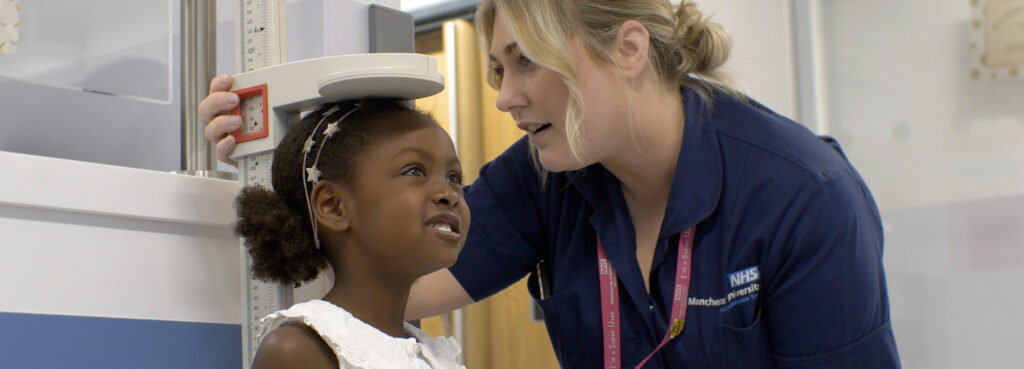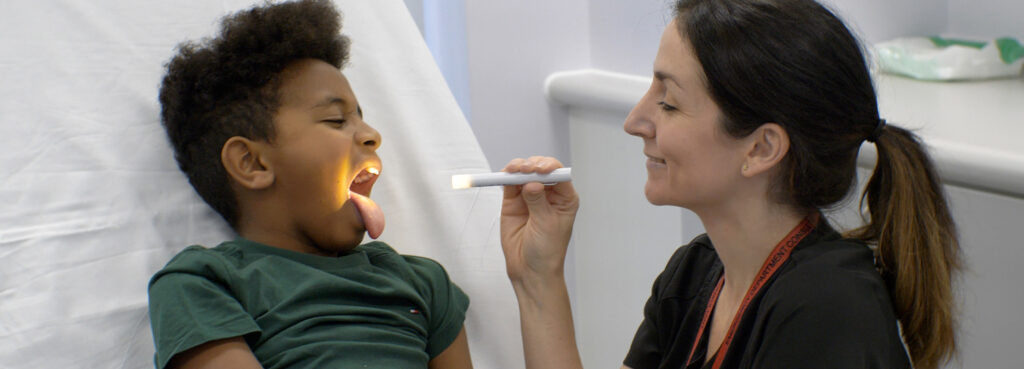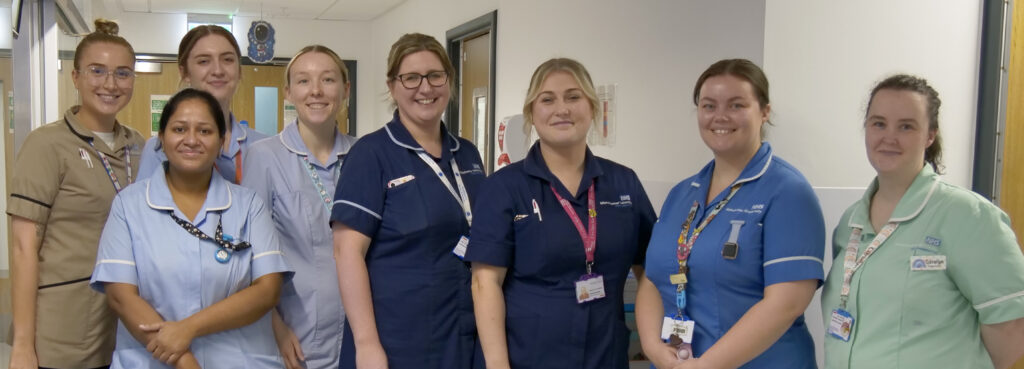About Us
We see about 50,000 children each year with medical, surgical and mental health emergencies. We are also a designated regional Paediatric Major Trauma Centre and see severely injured children from Manchester and across the North West region. We provide support and advice to our local District General Hospitals caring for patients in their area.
Young people aged 16 and over will need to attend an Adult Emergency department. You can find your nearest Adult Emergency Department on the NHS website.

How to find us
To access the Paediatric Emergency Department by car, enter the hospital site from the Hathersage Road entrance, where there is Hathersage Road car park and a drop off facility. The postcode is M13 0FH.
What to expect when you come to the Paediatric Emergency Department
Reception
You will be directed to reception when you arrive where your child will be registered.
Triage
Every child who comes to the Paediatric Emergency Department will be triaged, so that patients can be seen in order of priority. The triage nurse will ask some questions and do some observations such as heart rate and oxygen saturations. They will then assign a triage category, and depending on the urgency of your presentation, you may be asked to have a seat in the waiting room.
Green – we feel your child is safe to wait for a consultation. These children may wait the longest.
Yellow – your child needs to be seen and will be prioritised but there may still be a wait.
Orange – your child needs to be seen urgently. They will be seen as soon as a clinician is available and may be taken into a cubicle to wait.
Red – your child is very unwell and needs to be seen immediately.
When the department is busy and there are long waits, some families may be re-directed from triage to other services, such as the Acute Children’s Treatment Service.
Waiting
We understand long waits can be frustrating. In our department the sickest children will always be seen first. Some of the sickest children may arrive via a different entrance so you may not be aware of their arrival in the department.
This means that, no matter how worried you are about your child, if you are presenting with a minor problem you may have to wait for some time. At peak times, the department gets very busy and this may mean long waiting times. If you are waiting and are getting increasingly worried about your child you should let a member of staff know.
There are two main waiting areas: Purple zone and Orange zone.
Being seen
Children are seen in order of priority and will be assessed by either one of our doctors or an Advanced Nurse Practitioner.
After being seen, you may be asked to return to the waiting room instead of staying in a cubicle.
Leaving
After being seen you will be either discharged home or admitted to the hospital. You may be asked to stay for further tests or a period of observation. If that is the case you may be moved to the Children’s Clinical Decision Unit (CCDU), which is part of the Paediatric Emergency Department.
If you are discharged home, your GP will receive an electronic copy of your discharge letter. If your child needs an attendance note for school, this can be supplied by the PED reception staff.
If you decide to take your child home before they have been seen or discharged, please inform a member of staff so we can check it is safe to do so. We will then provide you with safety netting advice and an information leaflet.

What to expect if you come to the Paediatric Emergency Department with a mental health problem
Getting help can be hard, but we want to make it easier. We know that both parents and young people coming to us with a mental health problem will often be feeling very worried or upset, but it is important to know that not only can coming to hospital be crucial for keeping them safe, but it can mark a turning point in managing their illness.
Triage
First you will be seen by a nurse who will ask you about the problems you are having including very personal questions about how you are feeling, which often includes asking about suicidal thoughts. We know that these are hard questions to answer, but it is important to try to share as much as possible.
Being Seen Twice
You may be seen by both the Mental Health Team and the medical team. The Mental Health Team will go into greater depth with you about your thoughts and feelings, but sometimes you will be asked the same questions by both teams and this is normal.
Waiting
The Mental Health Team are not based in our hospital so there may be a longer wait for them than the medical team. If you prefer, we have a quiet side room where you can wait. There are many resources that can be helpful for anxiety, low mood and dark thoughts; it may be helpful to access these whilst waiting.
Sensitive Information
Doctors and Nurses have a duty to be non-judgemental, and we treat information given to us as strictly confidential, only sharing it where absolutely necessary for your care. We treat every child or young person with respect and include them as far as possible in decisions that affect them. Young people are entitled to know what information will be shared and with whom.
We may ask parents or caregivers to step outside when speaking to a young person about sensitive topics, please do not be offended if we do this.
You are not alone. 1 in 8 young people will experience a mental health problem, and we are here to help you.
Making your visit comfortable
We are here to help. Your child’s safety is our number one priority, and your comfort is also important to us.
There are shops that sell food, drinks and other items in the main entrance of the Royal Manchester Children’s Hospital. There are also vending machines selling drinks and snacks.
There are toilets and breastfeeding rooms located within our waiting rooms. There are also toys and colouring sheets available in the department and children’s movies shown on portable TVs.
We have a play specialist available to help your child with treatments or procedures that may be distressing and we have a sensory room for children with special needs,
Our staff will help to assist you in any other way that we can to make your visit as comfortable as possible.
Please note that antisocial behaviour in our department or anger, aggression or rudeness directed towards our staff will not be tolerated. For the safety of all our patients and staff we have security on site at all times.
Compliments and Feedback
Our staff do everything they can to ensure that you receive the best possible care. We are continually trying to improve our services and are always interested to hear your views. By understanding what matters to you, we can continue to improve our services.
If you are happy with your experience, please let us know and we will pass on your compliments to the staff concerned. If we have got something wrong, we want the opportunity to put things right as quickly as possible.
We take all feedback very seriously and guarantee that your care will not be compromised in any way if you raise a concern or make a complaint. There are a number of ways you can tell us about your experience.
Our Staff
The Paediatric Emergency Department is staffed by Consultant specialists in Paediatric Emergency Medicine, an experienced Paediatric nursing team, Resident doctors and Advanced Nurse Practitioners. We have a superb extended team including Play Specialists, health care assistants, administrative and reception staff and domestic staff. We also welcome medical students.
Research and Training
In addition to the clinical work, we are also actively engaged in activities to improve patient care through clinical governance, patient safety, quality improvement, audit and research. The Paediatric Emergency Department participates in a range of local, regional and national research to improve emergency care for children including those linked to PERUKI.
The department has an active training program for doctors and nursing staff including paediatric simulation.

